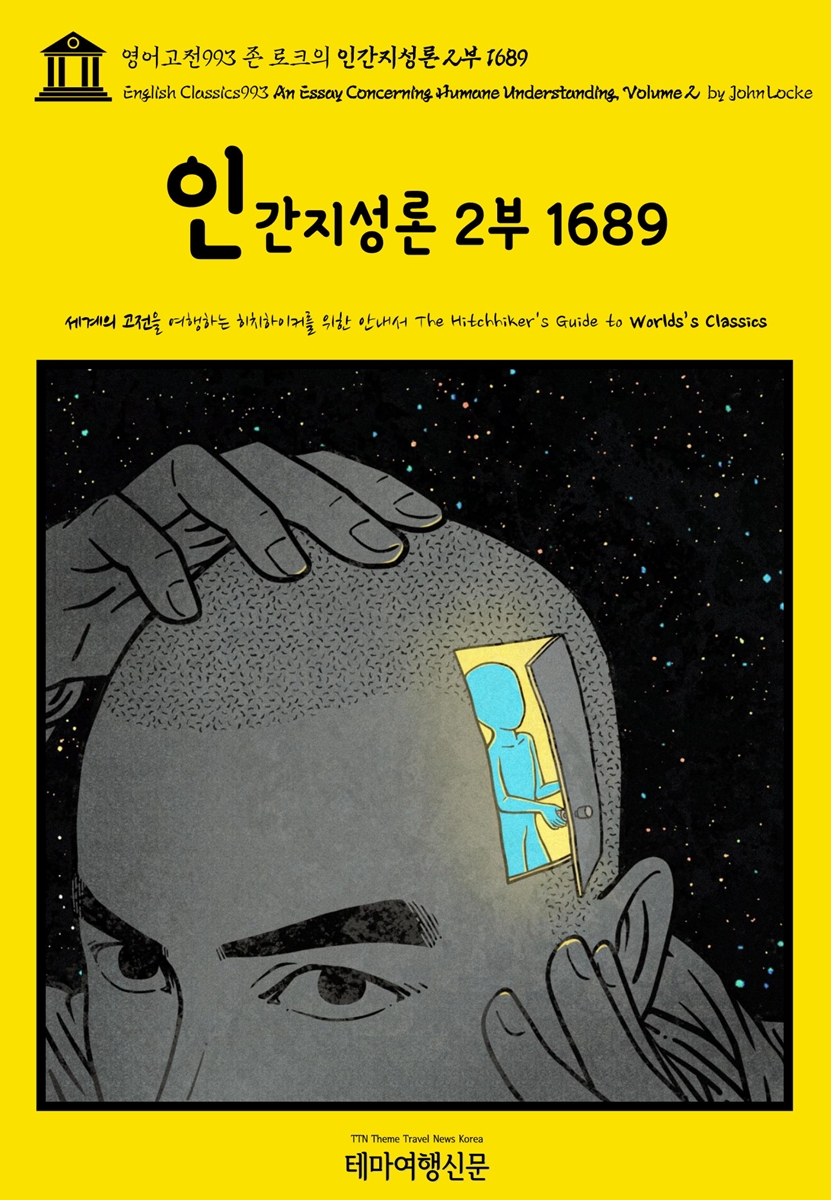▶ 인간지성론(An Essay concerning Human Understanding, 1690) : 인간지성론(人間知性論) 혹은 인간오성론(人間悟性論)으로 번역되는 존 로크의 인간지성론은 그가 1690년 발표한 대표작으로, ‘인간의 인식 능력’에 대한 파격적인 주장을 설파하였습니다. 작가는 총4장의 원고를 통해 ‘인간은 지식이나 관념 등을 갖추지 않은 백지 상태, 일명 타불라 라사(Tabula rasa)로 태어난다.’(1장)고 주장하며, 기존의 이성주의자들의 생득적 관념(innate ideas)을 반박하였습니다. 타불라 라사(Tabula rasa)란 ‘깨끗한 석판’, ‘아무 것도 쓰이지 않은 석판’이란 뜻의 라틴어입니다. 또한 ‘관념이란 경험에 의해 생긴다.(2장)는 주장을 펼쳤으며, 이로써 존 로크는 최초의 영국 경험론자(the first of the British empiricists)라 불리게 됩니다. 테마여행신문 TTN Korea 영어고전(English Classics)과 함께 어제도, 오늘도, 내일도 멋진 문학여행을! B
▶ THE EPISTLE TO THE READER. READER, To explain this a little more particularly. By DETERMINATE, when applied to a simple idea, I mean that simple appearance which the mind has in its view, or perceives in itself, when that idea is said to be in it: by DETERMINED, when applied to a complex idea, I mean such an one as consists of a determinate number of certain simple or less complex ideas, joined in such a proportion and situation as the mind has before its view, and sees in itself, when that idea is present in it, or should be present in it, when a man gives a name to it.
▷ 독자에게 보내는 서신. 독자 여러분, 이것을 좀 더 구체적으로 설명하자면. 단순 관념에 적용될 때 결정이란, 그 관념이 그 안에 있다고 말할 때 마음이 그 관점에서 가지고 있거나 그 자체로 인식하는 단순한 모습을 의미합니다. 결정된 수의 단순하거나 덜 복잡한 아이디어로 구성되어 있고, 마음이 보기 전에 가지고 있는 비율과 상황에 결합되어 있고, 그 아이디어가 그 안에 있거나 있어야 할 때 그 자체로 보는 것입니다. 그것은 사람이 그것에 이름을 붙일 때입니다.
▶ CHAPTER I. OF WORDS OR LANGUAGE IN GENERAL. 1. Man fitted to form articulated Sounds. God, having designed man for a sociable creature, made him not only with an inclination, and under a necessity to have fellowship with those of his own kind, but furnished him also with language, which was to be the great instrument and common tie of society. Man, therefore, had by nature his organs so fashioned, as to be fit to frame articulate sounds, which we call words. But this was not enough to produce language; for parrots, and several other birds, will be taught to make articulate sounds distinct enough, which yet by no means are capable of language.
▷ 일반 단어 또는 언어에 관한 제1장. 1. 분절된 소리를 형성하는 데 적합한 사람. 하나님은 사람을 사교적인 피조물로 만드셨고, 그와 같은 부류의 사람들과 사귀고자 하는 성향과 필요에 따라 그를 만드셨을 뿐만 아니라 언어도 주셨습니다. 사회. 그러므로 인간은 본질적으로 우리가 단어라고 부르는 명료한 소리의 틀을 잡기에 적합하도록 만들어진 기관을 가지고 있습니다. 그러나 이것은 언어를 생산하기에 충분하지 않았습니다. 앵무새와 몇몇 다른 새들은 아직 언어를 할 수 없는 명확한 소리를 충분히 뚜렷하게 만드는 법을 배우게 될 것입니다.
▶ CHAPTER IV. OF THE REALITY OF KNOWLEDGE. 1. Objection. 'To what purpose all this stir? Knowledge, say you, is only the perception of the agreement or disagreement of our own ideas: but who knows what those ideas may be? Is there anything so extravagant as the imaginations of men's brains? Where is the head that has no chimeras in it? Or if there be a sober and a wise man, what difference will there be, by your rules, between his knowledge and that of the most extravagant fancy in the world? They both have their ideas, and perceive their agreement and disagreement one with another.
▷ 제4장. 지식의 실재. 1. 반대. '이 모든 것이 무슨 목적으로 휘젓는가? 지식은 우리 자신의 아이디어에 대한 동의 또는 불일치에 대한 인식일 뿐이라고 당신은 말합니다. 그러나 그러한 아이디어가 무엇인지 누가 압니까? 인간 두뇌의 상상만큼 사치스러운 것이 있을까? 키메라가 없는 머리는 어디에 있습니까? 또는 냉정하고 현명한 사람이 있다면, 당신의 규칙에 따라 그의 지식과 세상에서 가장 사치스러운 공상의 지식 사이에 어떤 차이가 있습니까? 그들은 둘 다 자신의 생각을 가지고 있으며 서로의 동의와 불일치를 인식합니다.
▶ CHAPTER XXI. OF THE DIVISION OF THE SCIENCES. 1. Science may be divided into three sorts. All that can fall within the compass of human understanding, being either, FIRST, the nature of things, as they are in themselves, their relations, and their manner of operation: or, SECONDLY, that which man himself ought to do, as a rational and voluntary agent, for the attainment of any end, especially happiness: or, THIRDLY, the ways and means whereby the knowledge of both the one and the other of these is attained and communicated; I think science may be divided properly into these three sorts:?
▷ 제21장. 과학 분과의. 1. 과학은 세 종류로 나눌 수 있습니다. 인간 이해의 범위 안에 들어갈 수 있는 모든 것, 첫째는 사물의 본질, 사물의 관계, 작동 방식이거나, 둘째는 인간 자신이 어떤 목적, 특히 행복을 달성하기 위한 합리적이고 자발적인 행위자, 또는 셋째, 이들 중 하나와 다른 하나에 대한 지식이 달성되고 전달되는 방법과 수단; 과학은 다음 세 가지 종류로 적절하게 나눌 수 있다고 생각합니다.






